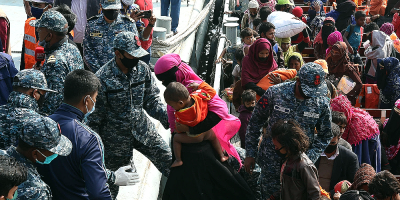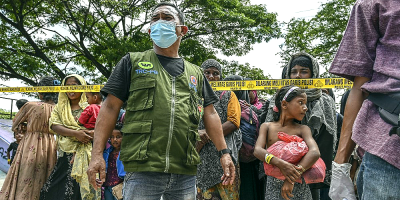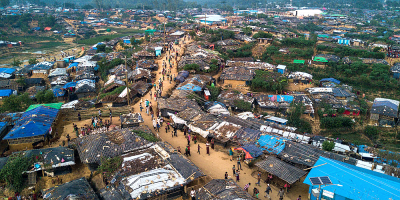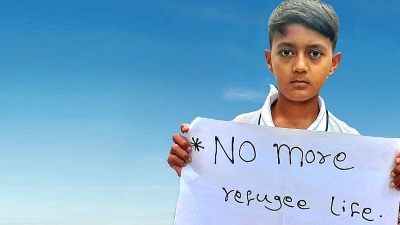Long-term detention of the Rohingyas will not fundamentally solve the problem.
The massive prison break involving 528 Rohingya detainees from the immigration depot in Relau, Bandar Baharu, Kedah, has seen 390 fleeing detainees rearrested as of press time, while 130 others are still on the run.
The sad thing is that six escapees, including two children, were killed by passing vehicles while attempting to cross the North-South Expressway.
Why did these Rohingya detainees escape the detention depot? Police investigation reveals a mastermind, who is still at large at this moment, inciting the riot. The investigation has also revealed that the escapees were not unhappy with the management at the detention depot, and they escaped mainly because they wanted to be free.
Did around a score of enforcement officials guarding the detention depot observe any sign of mass jailbreak intention prior to the incident? If they had noted any unusual intent, they should have reinforced the surveillance or at least attempted to pacify the detainees.
These Rohingya detainees had destroyed the gate and fence before their escape. The authorities are obliged to probe whether there was any element of dereliction of duty on the part of the wardens on duty for failing to stop the prison break.
As we are hunting down the mastermind in this whole thing, perhaps the officials on duty should also be held accountable for negligence.
The Rohingya refugees have been elevated to an international issue of concern, and the way Malaysia handles asylum seekers and refugees over the past couple of years in particular, has been placed under the microscope by the international community.
Expectedly, the mass prison break by the Rohingya detainees this time is set to trigger more heated debates here and abroad.
Lawyers For Liberty has pointed out that the authorities have no substantial reasons to detain such a large number of Rohingyas. Infinite detention of migrants by the immigration department is not permitted under the country’s immigration law. And as a member of the United Nations Human Rights Council (UNHRC), Malaysia should by right adhere to the relevant international specifications and criteria.
In another development, home minister Hamzah Zainudin has emphasized that the country does not recognize the status of refugees, and has allowed the Rohingyas to stay here wholly on humanitarian grounds.
UNHRC figures show that as of January this year, Malaysia registered a total of 180,000 refugees and asylum seekers, of whom 100,000 were Rohingyas.
Under the principle of non-refoulement, these Rohingyas cannot be sent back to their country of origin.
Foreign minister Saifuddin Abdullah said in the parliament that the Rohingya issue was tied to the position of the Myanmar government. That said, Asean appears to have been powerless in resolving the Rohingya issue, and member states will need to arrive at a further consensus on this matter.
Obviously Malaysia is unable to keep bearing the cost of keeping the Rohingyas here, and the regional bloc as a whole needs to more assertively apply pressure on the Myanmar government to resolve its internal conflicts.
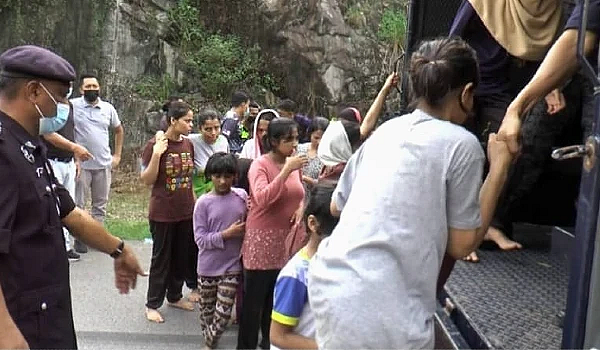
Human rights groups in Malaysia have insisted that the government must not see the Rohingyas as criminals even though our society generally sees them in a bad light, believing they are the source of the country’s security woes.
Meanwhile, NGOs have urged the government to put itself in the shoes of these Rohingyas in order to resolve their problems. Continued resentment and discrimination will not help at all.
Long-term detention of these people will not fundamentally solve the problem. Moreover, no vocational training has been arranged for the detainees and no substantial plans have been drawn up by the authorities, besides the massive financial burden which has also raised much concern among the Malaysian public.
Due to their inability to work and lead a normal life here, the Rohingyas have been constantly exploited and dismissed as a source of our social ills. A better solution will be to provide them with employment opportunities especially at a time additional workforce is needed to propel the country’s post-pandemic recovery.
Human resources minister Saravanan Murugan has said his ministry is currently exploring this possibility with the home affairs ministry. It is anyway better to put them in the job market—in particular labor-intensive sectors such as construction, plantation and domestic helpers—than to spend large sums of money and resources to manage them.
They should be allowed to have temporary work permits, enjoy fixed incomes and benefits. This will remarkably mitigate our social problems arising from poverty and lack of a sense of security.
That being said, the authorities must also take into consideration that such a move could potentially entice more Rohingyas and other nationalities of refugees to seek asylum and employment opportunities here. The government needs to make detailed arrangements to avoid creating a new problem while attempting to solve an old one.
ADVERTISEMENT
ADVERTISEMENT







